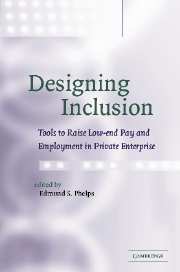Book contents
- Frontmatter
- Contents
- List of figures
- List of tables
- List of contributors
- Introduction
- 1 Low-wage employment subsidies in a labor-turnover model of the “natural rate”
- 2 Taxes, subsidies and equilibrium labor market outcomes
- 3 Learning-by-doing versus on-the-job training: using variation induced by the EITC to distinguish between models of skill formation
- 4 Unemployment vouchers versus low-wage subsidies
- Index
Introduction
Published online by Cambridge University Press: 22 September 2009
- Frontmatter
- Contents
- List of figures
- List of tables
- List of contributors
- Introduction
- 1 Low-wage employment subsidies in a labor-turnover model of the “natural rate”
- 2 Taxes, subsidies and equilibrium labor market outcomes
- 3 Learning-by-doing versus on-the-job training: using variation induced by the EITC to distinguish between models of skill formation
- 4 Unemployment vouchers versus low-wage subsidies
- Index
Summary
Access to a career and to a livelihood in society's mainstream economy is again a topic of discussion among economists and sociologists. Great value is placed on working-age people having the opportunity to obtain rewarding work in the formal economy and to earn enough in such jobs to be self-sufficient. These are the twin conditions for what is sometimes termed social inclusion, or, more aptly, economic inclusion.
The central importance of jobs and self-support derives from several human needs. People need to engage their minds and, for most people, jobs are the main means by which they encounter new problems to solve, discover their talents and expand their capabilities. People gain satisfaction from achieving something and experience personal growth from working with others. A great many people also want involvement in their society and, for them, to work in a job in the economy's mainstream is to be a part of society's grand project. Last but not least, the pecuniary reward from working is of both material and symbolic value. People want the dignity brought by self-support and the autonomy brought by having a substantial income of their own to meet their special needs. Earning one's own way – making enough to support one's self at a decent level by society's standards and to be a part of community life – is hugely important for people's self-respect.
- Type
- Chapter
- Information
- Designing InclusionTools to Raise Low-end Pay and Employment in Private Enterprise, pp. 1 - 15Publisher: Cambridge University PressPrint publication year: 2003
- 2
- Cited by



